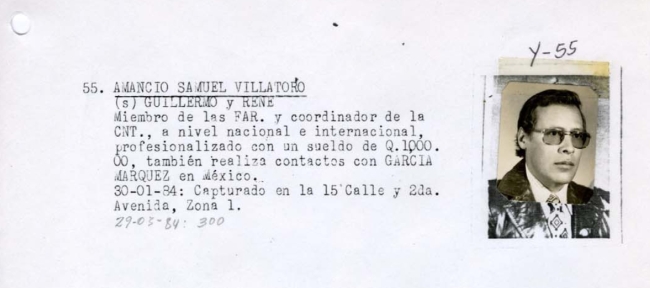Samuel Villatorro was only eight years old when his father Amancio was abducted and disappeared by the Guatemalan army on March 11, 1984. Amancio was 47 years old and had just assumed leadership in the National Labor Union, after its president was disappeared. Amancio was among the 45,000 people disappeared during the civil war in Guatemala. Last year, Samuel found the remains of his father in a mass grave, the first to be among the 5,000 remains dug up through the years.
Samuel’s story had heartened the families of disappeared that he met in the country, particularly Lorena “Aya” Santos, whose father Leo Velasco, a peace consultant of the National Democratic Front (NDF) was disappeared by suspected state agents on February 19, 2007.
“My father was disappeared six years ago. For Samuel, it took him 29 years, but he was still able to find his father’s remains. Maybe not all hope is lost for the families of desaparecidos,” said Santos, who is also the Secretary General of the Families of the Disappeared for Justice or Desaparecidos.
Samuel is a delegate of the International Conference for Human Rights and Peace in the Philippines being held on July 19 to 21 in Quezon City.
Samuel took part in a campaign called “My Name is Not XXX” which was an effort to put an image of the disappeared so as not to be forgotten by the Guatemalan society. The campaign led to the retrieval of remains in mass graves located in former military camps. The remains were subjected to DNA tests and one of the dead was identified to be Amancio Villatoro. His remains were found, together with 220 more bodies in an indigenous people’s community in San Juan Comalapa, Country of Chimaltenango where locals used to witness people coming in a military camp and never seen to come out. The locals knew many were buried in that place. More than 200 remains were retrieved with traditional clothing while six, among of them was Amancio were wearing modern clothes like t-shirts and pants. Amancio was wearing Levis jeans.
Several regimes after the civil war in Guatemala provided enough space for families of the disappeared to search for their loved ones. With the support of international non-government organizations, a machine that does DNA tests was donated to Guatemala to identify the retrieved remains of desaparecidos.
“The situation in the Philippines brings me back to the time when my father was still disappeared, giving me strong emotional clash.” Samuel said. Samuel was also a member of the Southern Tagalog Team of the International Solidarity Mission where together with other Latin American delegates, he interviewed victims of human rights violations in the heavily-militarized communities in Bondoc Peninsula, Quezon province,. There are two documented enforced disappearance in Southern Tagalog under the Noynoy Aquino Administration, Felix Balaston and Alfredo Bucal.
“Meeting Samuel is like meeting a brother from a distant land,” Santos said. “Both our fathers stood up for the principles they believed in,” Santos said. “Government violence unites victims of rights violations, and it’s amazing how an international conference like this brings victims together, to take the struggle for justice and peace globally.” ###

